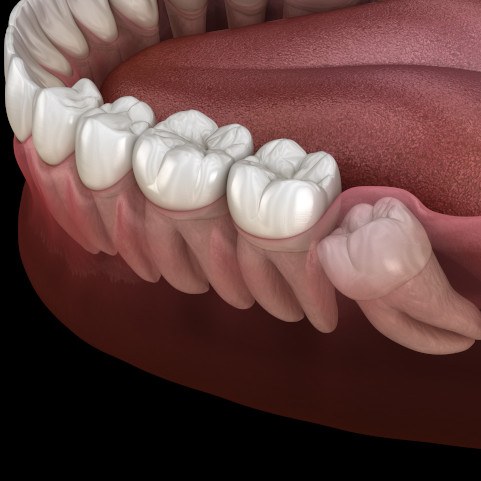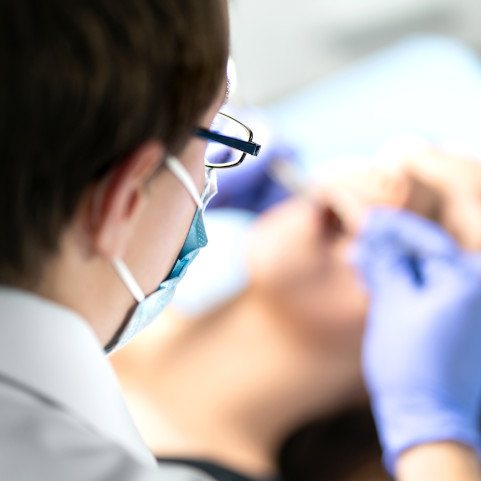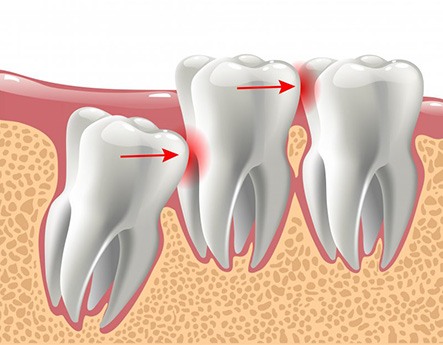Wisdom Tooth Extractions – Lewisville, TX

Removing Teeth That Are Nothing But Trouble
Around the ages of 17 to 25, many people begin to feel severe pain toward the backs of their mouths. This often indicates that the wisdom teeth – also known as third molars – are coming in. For most people, wisdom teeth are nothing but trouble; left alone, they could even harm your other teeth! That’s why Dr. Niki Jayswal often recommends removing them. She proudly offers safe and comfortable wisdom tooth extractions at Nexus Dental of Lewisville. Call us today to find out if your wisdom teeth need to go!
Why Choose Nexus Dental of Lewisville for Wisdom Tooth Extractions?
- Same-Day Emergency Appointments
- Privately-Owned, Insurance-Friendly Dental Practice
- Financial Options Available
What are Wisdom Teeth?

Wisdom teeth are the third set of molars, and they usually make an appearance in early adulthood. Throughout the years, our Lewisville dental team will monitor their development. If there comes a point where they are negatively impacting your oral health (or they have the potential to do so), then we will recommend moving forward with the extraction process.
Why Do Wisdom Teeth Need to Be Removed?

Early humans may have benefited from these extra teeth in order to chew tough, uncooked foods, but in modern times, wisdom teeth are unnecessary. Indeed, most people don’t even have room in their jaws to accommodate the third molars. As a result, they may become trapped – or impacted – underneath the gum line. This can be quite painful, and it can even damage the roots of your other teeth. Even if your wisdom teeth do erupt, they can contribute to decay, crowding, and many other oral health issues. Ultimately, Dr. Jayswal can evaluate whether removing your wisdom teeth would be the healthiest option for you.
What to Expect from the Wisdom Teeth Procedure

There are two main types of extractions: simple and surgical. Before providing you with a little more information on each, we need to start with the fact that your mouth will be completely numb in both cases. As a result, you won’t feel any discomfort as we work to remove your wisdom teeth.
- Simple extraction : If your wisdom teeth have broken through the gumline, then Dr. Jayswal will rock them back and forth until they are ready to be removed.
- Surgical extraction : If your wisdom teeth are trapped underneath the gumline, then Dr. Jayswal will need to create a small incision in your gums to access the tooth before removing it.
Recovering from Wisdom Teeth Extraction

Recovering from wisdom tooth surgery should only take a few days to a week at most. Our team will provide you with detailed aftercare instructions, which may include:
- Taking any prescribed antibiotics or pain medications as directed.
- Avoiding smoking or drinking through a straw.
- Sticking to a soft food diet at first and gradually incorporating heartier foods.
- Not exercising.
- Drinking lots of water to stay hydrated.
- Sleeping with your head elevated.
If you have any questions for us about wisdom tooth extractions – whether it’s about the procedure itself or the cost – don’t hesitate to get in touch with us. We’re here to answer any questions you have and help make the process of maintaining your healthy, happy smile as easy as possible!
Understanding the Cost of Wisdom Tooth Extractions

While wisdom tooth extraction can relieve chronic pain and prevent future infections, it’s understandable that you’d want to know how much you can expect to pay before committing to the procedure. The overall cost of a wisdom tooth extraction depends mostly on several factors, and the price varies from patient to patient based on their particular oral health situations. Here’s a brief guide to how much a tooth extraction can cost at our Lewisville office.
Factors That Can Impact the Cost of Wisdom Tooth Extractions

The overall price of wisdom tooth extraction depends on several important factors that we will discuss during your initial consultation. A few of these are:
- How many wisdom teeth are being removed: While most people have four wisdom teeth, some have three, two, or only one of them. Some people don’t have any at all.
- If your wisdom teeth are impacted: If a wisdom tooth fails to emerge completely from the gum tissue, it becomes impacted. A tooth that is fully or partially trapped in the soft tissue is harder to extract and creates tiny pockets in which harmful oral bacteria can thrive. However, a bony impaction involves a tooth lodged completely within the jawbone and requires the attention of an oral surgeon.
- Anesthesia methods employed: The right anesthetic treatment for you depends on whether you need a simple or surgical extraction, and the associated cost will be reflected in your bill.
- If you need a dental specialist: If your case is especially complex, we may need to refer you to an oral surgeon who may use a different pricing scale.
Does Dental Insurance Cover Wisdom Tooth Extractions?

While not all dental insurance plans cover dental surgeries, most cover wisdom tooth extractions at least in part depending on whether you’ve met your deductible or maximum for the year. The best way to learn what your plan covers is to discuss the matter with your insurance company directly, and choosing a provider who is in-network can help you keep out-of-pocket costs to a minimum.
How to Make Wisdom Tooth Extractions Affordable

Since we know that some people who need dental help are uninsured or underinsured, we offer financing options with little to no interest through CareCredit, a trusted third-party lender than can break your bill into small and easily manageable monthly installments. We’ll be happy to help you navigate your financing and payment options as well as your insurance policy, so please contact our staff if you have any questions.
Wisdom Tooth Extractions FAQs
How Do You Sleep After Wisdom Teeth Removal?
If you’ve had a toothache, then you know that getting a good night’s sleep while also experiencing discomfort, soreness, and sensitivity can be quite the challenge. Don’t worry though – there are several things you can do to set yourself up for success. First, stick to extremely soft, plain foods, like yogurt, especially the first three days following your procedure. Second, use a cold compress for 10 minutes at a time to alleviate swelling. Third, take prescribed or OTC pain medication as directed about 30 minutes before bed. When it comes time to actually go to sleep, make sure you keep your head elevated by propping yourself up on some pillows.
Tip: If possible, have someone you know and trust stay with you the first night. That way, they can wake you up periodically to make sure you’re doing okay, change the gauze as needed, and get you anything necessary, like more water.
How Soon Can I Eat After Wisdom Teeth Removal?
It usually takes an hour or two for the numbing agent to wear off. Plus, you want to keep the gauze pads in place to slow down bleeding immediately following the extraction. So, even if you feel hungry, make sure to follow your dentist’s instructions on when to eat. When that time does come, make sure that you stick to extremely soft foods that don’t require any chewing power. It’s also important that you avoid extremely hot and cold items since they can lead to considerable sensitivity. Around the one-week mark, you should be back to eating your usual diet.
Is Wisdom Tooth Removal Painful?
Good news: the procedure is virtually painless because your mouth will be numbed. We only use the word “virtually” because you may feel some pressure from time to time as we work to remove your tooth. But, again, no pain. We will also provide you with aftercare instructions designed to help you heal comfortably too, like taking OTC pain medication, keeping your head elevated, and using a cold compress.
Does Everyone Have Wisdom Teeth?
No, not everyone has wisdom teeth. Since genetics play a big role, you may not have a third set of molars if your parents or their parents didn’t. Throughout the years, we will take X-rays to take a look at what’s going on underneath the surface. If they don’t come in or they come in straight, that’s perfectly fine! If they get trapped underneath the gumline or grow in sideways, however, they need to be removed.
How Should I Prepare for My Wisdom Tooth Extraction?
There are a few more obvious things, like going to the store to buy soft foods for your recovery. But are there any foods or drinks you need to avoid? Can you eat the morning of? Can you drive yourself home from your appointment? These are all great questions, and ones that we will answer at your initial appointment. Of course, if you need a refresher or want to double-check, you’re more than welcome to give us a call – we’re always happy to help!
